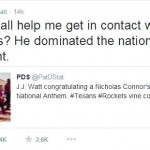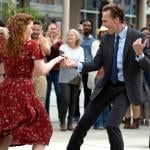My husband and I were just flipping through the channels and found the Jerry Lewis Telethon for Muscular Dystrophy. It was the local portion of the show, and we didn’t stay long; we’ll send in our contribution this week.
I believe I have contributed to this charity every Labor Day Weekend since I can remember, either by asking my parents to send in my pennies, or by volunteering at the Telethon centers, and in various fund-raising affairs. Now -and since I was 20, I guess- it’s just “send a check.”
Over at Inside Catholic, Deal Hudson is watching the show and writes:
After ten minutes, it appears this may be Jerry’s last year. Already he has told two jokes that shouldn’t have been told in front of an audience filled with children. I would guess he is heavily medicated given his recurrent illnesses over the past years. . . .
He still sings pretty well though for a guy born in 1926, although he understandably runs out of breath. I rarely miss the close of the show when he sings, “When you walk through a storm…..”
Lewis has never disclosed the reason he became an advocate for those with muscular dystrophy and related diseases. Am I alone in hoping one day, after his death, that reason will be disclosed? There’s an important biography waiting to be written about Jerry Lewis, one that I hope will cut through the kitsch he disguises himself with and make the case for his greatness, both as an artist and a man.
“You’ll Never Walk Alone” (or “Don’t Be Afraid of the Dark,” I’ve heard it called) is from the Rodgers and Hammerstein musical, Carousel, and Lewis’ rendition of it is yes, schmaltzy, but affecting, still.
I recall working on the Telethon one year and my little supply table was not far off the stage. Lewis’ sang and everyone wept; people who’d worked the show for years wept. Yes, some people were just exhausted and their tears were a measure of that. But everyone wept. People knew it was schmaltz but wept, still, because beneath the almost overwhelming sentimentality of it all there was something very true, and identifiable. Everyone has been afraid of the dark. Everyone has felt alone, isolated, hopeless. Exhausted.
Lewis sings the song for his “kids” (and yes, I’m completely aware that some people with MDA resent that designation) but I’ve always thought that, in a way, he was singing it for himself. He is 83 years old, now, and both venerable and obnoxious, but he is still -eternally- a little boy working very hard for attention, validation and company.
Last February, Lewis received an honorary statue from the Academy of Arts and Sciences, the Jean Hersholt Humanitarian Award for his ceaseless work on behalf of Muscular Dystrophy, and it was recognition long-overdue. In 1977, back when it still meant something, Lewis was nominated for a Nobel Peace Prize by Rep. Les Aspin, (D-Wis).
Current audiences probably cannot appreciate how immensely huge Lewis was in the world of comedy and film. He’s been in show business for most of his life, beginning in Vaudeville, just as it was beginning to die out.
Jerry Lewis has a big ego and a big mouth. He won acclaim for his performance as the nasty talk-show host in The King of Comedy and some wags said he was barely acting. On the other hand, in his book, Big Julie of Vegas, that city’s famous Julius Weintraub recalled gifting Lewis with a Mezuzah pendant and Lewis clutching it to his chest in tears saying, “this is the best thing anyone has ever given me.”
He cannot have been an easy man to deal with. While his comedy is not to everyone’s taste (I love some of his films, cringe at others), his creativity and innovated ideas are hard to deny.
Jerry Lewis is a complicated man, larger-than-life man, and I suspect he is imbued with complicated, larger-than-life emotions. But one sense that where he loves, he loves greatly, which means he is capable of huge hurt, as well. His book Dean and Me: (A Love Story), is an unabashed declaration of lasting affection for his ex-partner, Dean Martin.
It would take a supremely gifted biographer to do him justice.
I wrote of him, back in February:
While doing a little volunteering for MDA, ‘way back in the day, I got to watch Lewis in action at a fund-raiser. He was loud, impatient, and boorish in exactly the way one can be loud, impatient and boorish over one’s passions. He was also focused, capable of quiet one-on-one and selfless listening – a strange hybrid, part narcissist, part servant. For the brief time I saw him, he was a ball of energy, and quite simply all for those suffering from neuromuscular diseases.
I’ve never forgotten it. I came away thinking that Lewis was “a right bastard,” in the sense that he would not allow anyone or anything to divert the energy he meant for “his people.” A “right bastard” in the way people with vision can be single-minded, stubborn, difficult, magnificent bastards.
Included in that post was a very moving story about the off-camera, private Lewis who was capable of great kindness and generosity, but then (as I wrote here: ” . . .we most of us do our share of good, proportionate to our means and connections…” From that perspective, of course, we are all both remarkable and common. But perhaps when we see public figures who puzzle or frustrate us, the stories of small personal kindnesses are helpful.
Anyway, if you get a chance, peek in on the telethon this year, and make a donation, if you can. The MDA is an incredible organization of great people who do a lot of good for a lot of families, and whose research has resulted in many therapeutic applications, even outside of treatment for dystrophic disease.
Who knows how much longer we’ll have Jerry to roll our eyes at and admire? And, perhaps echoing this, remember; there is nothing to be afraid of.
Related: Jerry Lewis; Magnificent Bastard















